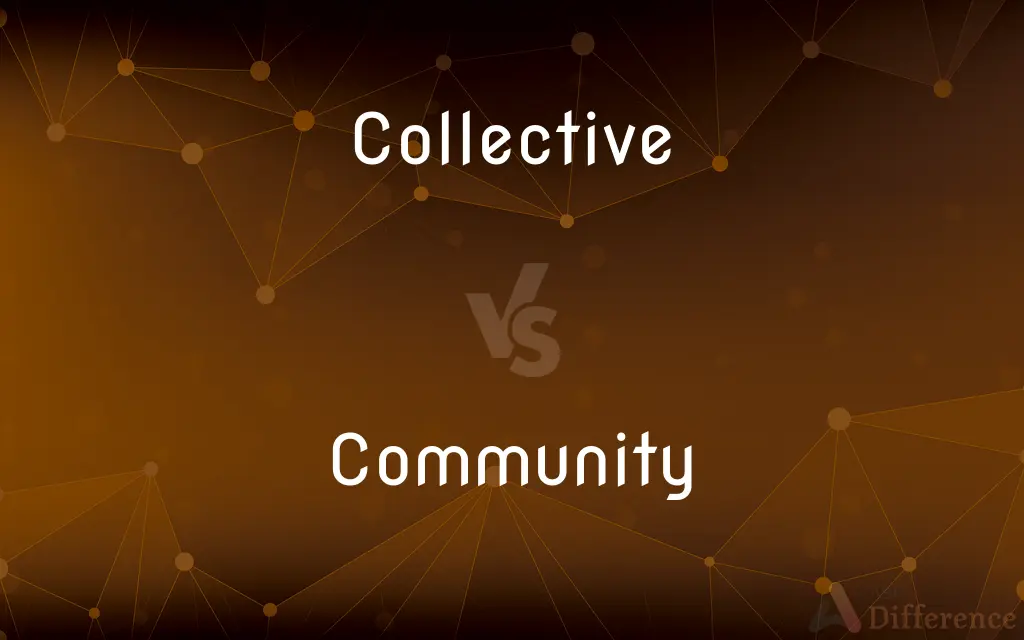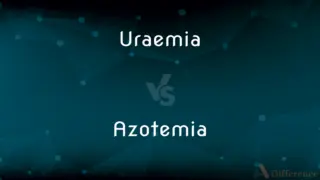Collective vs. Community — What's the Difference?
Edited by Tayyaba Rehman — By Fiza Rafique — Updated on March 22, 2024
A collective emphasizes shared or joint action towards a common goal, while a community focuses on a group of individuals sharing common interests or values.

Difference Between Collective and Community
Table of Contents
ADVERTISEMENT
Key Differences
Collectives are often formed for specific purposes or projects, with members actively working together to achieve a shared objective. Here, the emphasis is on joint action and shared responsibilities. On the other hand, communities are broader, encompassing groups of people who share common interests, values, or identities, but not necessarily working towards a specific joint goal.
While collectives are typically more goal-oriented, communities focus more on the social and emotional bonds between members. A tech collective might focus on developing open-source software projects, emphasizing collaboration and shared expertise, whereas a tech community might simply share interests in technology, offering a space for discussion, networking, and support without a common project.
Collectives often have a more defined structure or organization to facilitate their specific objectives, including roles, responsibilities, and sometimes membership criteria. This structure helps manage the collaborative efforts towards the collective's goals. Conversely, communities may have less formal structures, with participation and roles being more fluid, reflecting the broader and more inclusive nature of community relationships.
The concept of identity also differs between the two. In a collective, identity can be closely tied to the shared goal or activity. Members of a bicycle collective, for instance, might identify strongly with cycling advocacy or sustainable transportation. In contrast, community identity can be more about shared experiences, history, or values that bind individuals together, such as in an immigrant community sharing a common country of origin.
Comparison Chart
Purpose
Specific joint goals or projects.
Shared interests, values, or identities.
ADVERTISEMENT
Bond
Joint action and responsibilities.
Social and emotional connections.
Structure
More defined, with specific roles.
Less formal, more fluid participation.
Identity
Tied to shared goals or activities.
Based on shared experiences or values.
Examples
Artist collectives, tech collectives.
Neighborhoods, cultural or ethnic groups.
Compare with Definitions
Collective
An organization owned and run jointly by its members.
The food co-op is a successful example of a collective.
Community
A group of people with a common background or shared interests.
The immigrant community hosts an annual cultural festival.
Collective
The sum of individuals acting together.
The collective decision was to prioritize sustainability.
Community
A group of people living in the same place or having a particular characteristic in common.
The local community rallied to support the new park initiative.
Collective
A collaborative environment fostering shared goals.
The hackathon became a collective of innovative minds.
Community
A body of nations or states unified by common interests.
The international community condemned the act of aggression.
Collective
A shared or joint effort towards a common goal.
The recycling initiative was a collective effort by the community.
Community
A feeling of fellowship with others, as a result of sharing common attitudes, interests, and goals.
The online gaming community is very welcoming to newcomers.
Collective
A group working together on a shared project.
The artist collective opened a gallery to showcase their work.
Community
The condition of sharing or having certain attitudes and interests in common.
There's a strong sense of community among the volunteers.
Collective
A collective is a group of entities that share or are motivated by at least one common issue or interest, or work together to achieve a common objective. Collectives can differ from cooperatives in that they are not necessarily focused upon an economic benefit or saving, but can be that as well.
Community
A community is a social unit (a group of living things) with commonality such as norms, religion, values, customs, or identity. Communities may share a sense of place situated in a given geographical area (e.g.
Collective
Assembled into or viewed as a whole.
Community
A group of people living in the same locality and under the same government.
Collective
Of, relating to, characteristic of, or made by a number of people acting as a group
A collective decision.
Community
The district or locality in which such a group lives.
Collective
An undertaking, such as a business operation, set up on the principles or system of collectivism.
Community
A group of people having common interests
The scientific community.
The international business community.
Collective
A collective noun.
Community
A group viewed as forming a distinct segment of society
The gay community.
The community of color.
Collective
Formed by gathering or collecting; gathered into a mass, sum, or body.
The collective body of a nation
Community
Similarity or identity
A community of interests.
Collective
Tending to collect; forming a collection.
Community
Sharing, participation, and fellowship
A sense of community.
Collective
Having plurality of origin or authority.
Community
Society as a whole; the public.
Collective
(grammar) Expressing a collection or aggregate of individuals, by a singular form.
Community
A group of organisms interacting with one another and with the environment in a specific region.
Collective
(obsolete) Deducing consequences; reasoning; inferring.
Community
The region occupied by a group of interacting organisms.
Collective
A farm owned by a collection of people.
Community
(countable) A group sharing a common understanding, and often the same language, law, manners, and/or tradition.
Collective
One of more farms managed and owned, through the state, by the community.
Community
(countable) A residential or religious collective; a commune.
Collective
(grammar) A collective noun or name.
Community
A group of interdependent organisms inhabiting the same region and interacting with each other.
Collective
(by extension) A group dedicated to a particular cause or interest.
Community
A group of people interacting by electronic means for educational, professional, social, or other purposes; a virtual community.
Collective
The flight control used to control a helicopter's ascent or descent.
Community
(uncountable) The condition of having certain attitudes and interests in common.
Collective
Formed by gathering or collecting; gathered into a mass, sum, or body; congregated or aggregated; as, the collective body of a nation.
Community
Common enjoyment or possession; participation.
A community of goods
Collective
Deducing consequences; reasoning; inferring.
Community
Common character; likeness.
Collective
Expressing a collection or aggregate of individuals, by a singular form; as, a collective name or noun, like assembly, army, jury, etc.
Community
Commonness; frequency.
Collective
Tending to collect; forming a collection.
Local is his throne . . . to fix a point,A central point, collective of his sons.
Community
A local area within a county or county borough which is the lowest tier of local government, usually represented by a community council or town council, which is generally equivalent to a civil parish in England.
Collective
Having plurality of origin or authority; as, in diplomacy, a note signed by the representatives of several governments is called a collective note.
Community
Common possession or enjoyment; participation; as, a community of goods.
The original community of all things.
An unreserved community of thought and feeling.
Collective
A collective noun or name.
Community
A body of people having common rights, privileges, or interests, or living in the same place under the same laws and regulations; as, a community of monks. Hence a number of animals living in a common home or with some apparent association of interests.
Creatures that in communities exist.
Collective
Members of a cooperative enterprise
Community
Society at large; a commonwealth or state; a body politic; the public, or people in general.
Burdens upon the poorer classes of the community.
Collective
Done by or characteristic of individuals acting together;
A joint identity
The collective mind
The corporate good
Community
Common character; likeness.
The essential community of nature between organic growth and inorganic growth.
Collective
Forming a whole or aggregate
Community
Commonness; frequency.
Eyes . . . sick and blunted with community.
Collective
Set up on the principle of collectivism or ownership and production by the workers involved usually under the supervision of a government;
Collective farms
Community
A group of people living in a particular local area;
The team is drawn from all parts of the community
Community
A group of people having ethnic or cultural or religious characteristics in common;
The Christian community of the apostolic age
He was well known throughout the Catholic community
Community
Common ownership;
They shared a community of possessions
Community
A group of nations having common interests;
They hoped to join the NATO community
Community
The body of people in a learned occupation;
The news spread rapidly through the medical community
Community
Agreement as to goals;
The preachers and the bootleggers found they had a community of interests
Community
A district where people live; occupied primarily by private residences
Community
(ecology) a group of interdependent organisms inhabiting the same region and interacting with each other
Common Curiosities
How does membership in a collective differ from membership in a community?
Membership in a collective is often based on active participation towards shared goals, while community membership is more about shared identity or interests.
Can someone be part of a collective and a community at the same time?
Yes, individuals can be part of both, engaging in specific projects within a collective while also being part of a broader community.
What roles do collectives and communities play in society?
They both play crucial roles in fostering collaboration, support, and identity among members, though in different contexts and with different focuses.
Can a collective become a community?
Yes, over time, a collective’s members may develop a sense of community through shared experiences and goals.
Is it easier to join a community or a collective?
It generally depends on the specific requirements or openness of the group, but communities may be more broadly inclusive.
How do collectives impact individual identity?
Being part of a collective can strongly influence an individual's identity in relation to the collective’s goals or activities.
Why do people form collectives?
People form collectives to pool resources, collaborate, and achieve goals more effectively than they could individually.
What binds a community together?
Communities are bound by shared interests, values, or identities, and the mutual support members provide to each other.
What is the significance of community events?
Community events foster a sense of belonging, celebrate shared culture or interests, and strengthen community bonds.
How does communication differ in collectives and communities?
In collectives, communication often focuses on tasks and collaboration, whereas in communities, it may be more about sharing experiences and support.
What is the main difference between a collective and a community?
A collective focuses on joint action towards a common goal, whereas a community centers around shared interests or values among its members.
How do communities support their members?
Communities provide social and emotional support, a sense of belonging, and sometimes material resources to their members.
Can a collective have members from different communities?
Yes, collectives can include members from diverse communities, especially if the collective’s goal resonates across different groups.
How are collectives organized?
Collectives are typically organized around specific projects or goals, with defined roles and shared responsibilities.
What challenges do collectives face?
Challenges include coordinating efforts, managing resources efficiently, and maintaining member engagement towards the collective’s goals.
Share Your Discovery

Previous Comparison
Uraemia vs. Azotemia
Next Comparison
Legendary vs. LegacyAuthor Spotlight
Written by
Fiza RafiqueFiza Rafique is a skilled content writer at AskDifference.com, where she meticulously refines and enhances written pieces. Drawing from her vast editorial expertise, Fiza ensures clarity, accuracy, and precision in every article. Passionate about language, she continually seeks to elevate the quality of content for readers worldwide.
Edited by
Tayyaba RehmanTayyaba Rehman is a distinguished writer, currently serving as a primary contributor to askdifference.com. As a researcher in semantics and etymology, Tayyaba's passion for the complexity of languages and their distinctions has found a perfect home on the platform. Tayyaba delves into the intricacies of language, distinguishing between commonly confused words and phrases, thereby providing clarity for readers worldwide.














































